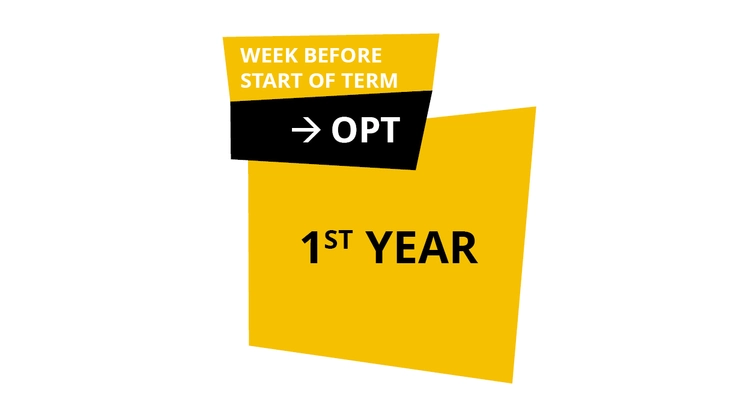
At the beginning of the bachelor course, proficiency in English at level B2 of the European Framework of Reference for Languages is expected. No certificate needs to be submitted at the time of application.
In the week before the start of term, all students must complete an Online Placement Test (OPT), which takes place during the Student Orientation Days. Only English native speakers are exempt.
According to their score, students take language classes corresponding to their individual language level.
Students who do not achieve 75 points in the test and thus cannot confirm the B2 level may improve their English skills in the framework of Additional Language Studies (module ZS). The regular English and American Studies modules can then be taken in the following year.
German is not your mothertongue? In order to study at a German university, you must provide proof of German language skills. At the time of application, you must have proficiency at level B1. At the start of term, you will need the “Deutsche Sprachprüfung für den Hochschulzugang” (DSH-2 or -3) or an equivalent certificate (e.g. Telc C1 Hochschule or TestDaF with ≥4 points in all areas).
More information at the International Office.

By the end of the BA course, students need to prove their language proficiency at C1 level. The C1 examination counts as the module grade for all language practice classes of the Q phase. Without the C1-test graduation is not possible!
All language proficiency tests are carried out by the languages centre. The recognition of external certificates (IELTS, CAE, TOEFL) can be requested.
I can read articles and reports concerned with contemporary problems in which the writers adopt particular attitudes or viewpoints. I can understand contemporary literary prose.
I can understand extended speech and lectures and follow even complex lines of argument provided the topic is reasonably familiar. I can understand most TV news and current affairs programmes. I can understand the majority of films in standard dialect.
I can write clear, detailed text on a wide range of subjects related to my interests. I can write an essay or report, passing on information or giving reasons in support of or against a particular point of view. I can write letters highlighting the personal significance of events and experiences.
I can present clear, detailed descriptions on a wide range of subjects related to my field of interest. I can explain a viewpoint on a topical issue giving the advantages and disadvantages of various options.
I can interact with a degree of fluency and spontaneity that makes regular interaction with native speakers quite possible. I can take an active part in discussion in familiar contexts, accounting for and sustaining my views.
I can understand long and complex factual and literary texts, appreciating distinctions of style. I can understand specialised articles and longer technical instructions, even when they do not relate to my field.
I can understand extended speech even when it is not clearly structured and when relationships are only implied and not signalled explicitly. I can understand television programmes and films without too much effort.
I can express myself in clear, well-structured text, expressing points of view at some length. I can write about complex subjects in a letter, an essay or a report, underlining what I consider to be the salient issues. I can select a style appropriate to the reader in mind.
I can present clear, detailed descriptions of complex subjects integrating sub-themes, developing particular points and rounding off with an appropriate conclusion.
I can express myself fluently and spontaneously without much obvious searching for expressions. I can use language flexibly and effectively for social and professional purposes. I can formulate ideas and opinions with precision and relate my contribution skilfully to those of other speakers.
I can read with ease virtually all forms of the written language, including abstract, structurally or linguistically complex texts such as manuals, specialised articles and literary works.
I have no difficulty in understanding any kind of spoken language, whether live or broadcast, even when delivered at fast native speed, provided. I have some time to get familiar with the accent.
I can write clear, smoothly-flowing text in an appropriate style. I can write complex letters, reports or articles which present a case with an effective logical structure which helps the recipient to notice and remember significant points. I can write summaries and reviews of professional or literary works.
I can present a clear, smoothly-flowing description or argument in a style appropriate to the context and with an effective logical structure which helps the recipient to notice and remember significant points.
I can take part effortlessly in any conversation or discussion and have a good familiarity with idiomatic expressions and colloquialisms. I can express myself fluently and convey finer shades of meaning precisely. If I do have a problem I can backtrack and restructure around the difficulty so smoothly that other people are hardly aware of it.
I can understand the main points of clear standard speech on familiar matters regularly encountered in work, school, leisure, etc. I can understand the main point of many radio or TV programmes on current affairs or topics of personal or professional interest when the delivery is relatively slow and clear.
I can understand extended speech and lectures and follow even complex lines of argument provided the topic is reasonably familiar. I can understand most TV news and current affairs programmes. I can understand the majority of films in standard dialect.
I can write simple connected text on topics which are familiar or of personal interest. I can write personal letters describing experiences and impressions.
I can write clear, detailed text on a wide range of subjects related to my interests. I can write an essay or report, passing on information or giving reasons in support of or against a particular point of view. I can write letters highlighting the personal significance of events and experiences.
I can express myself in clear, well-structured text, expressing points of view at some length. I can write about complex subjects in a letter, an essay or a report, underlining what I consider to be the salient issues. I can select a style appropriate to the reader in mind.
I can write clear, smoothly-flowing text in an appropriate style. I can write complex letters, reports or articles which present a case with an effective logical structure which helps the recipient to notice and remember significant points. I can write summaries and reviews of professional or literary works.
Production
I can connect phrases in a simple way in order to describe experiences and events, my dreams, hopes and ambitions. I can briefly give reasons and explanations for opinions and plans. I can narrate a story or relate the plot of a book or film and describe my reactions.
Interaction
I can deal with most situations likely to arise whilst travelling in an area where the language is spoken. I can enter unprepared into conversation on topics that are familiar, of personal interest or pertinent to everyday life (e.g. family, hobbies, work, travel and current events).
Production
I can present clear, detailed descriptions on a wide range of subjects related to my field of interest. I can explain a viewpoint on a topical issue giving the advantages and disadvantages of various options.
Interaction
I can interact with a degree of fluency and spontaneity that makes regular interaction with native speakers quite possible. I can take an active part in discussion in familiar contexts, accounting for and sustaining my views.
Production
I can present clear, detailed descriptions of complex subjects integrating sub-themes, developing particular points and rounding off with an appropriate conclusion.
Interaction
I can express myself fluently and spontaneously without much obvious searching for expressions. I can use language flexibly and effectively for social and professional purposes. I can formulate ideas and opinions with precision and relate my contribution skilfully to those of other speakers.
Production
I can present a clear, smoothly-flowing description or argument in a style appropriate to the context and with an effective logical structure which helps the recipient to notice and remember significant points.
Interaction
I can take part effortlessly in any conversation or discussion and have a good familiarity with idiomatic expressions and colloquialisms. I can express myself fluently and convey finer shades of meaning precisely. If I do have a problem I can backtrack and restructure around the difficulty so smoothly that other people are hardly aware of it.